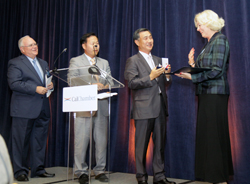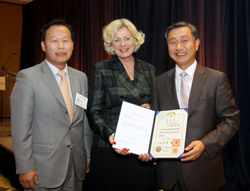Trading Partner Portal: South Korea
Overview
Joint Fact Sheet on President Donald J. Trump’s Meeting
with President Lee Jae Myung
The White House, November 13, 2025
The United States Signs Technology Prosperity Deals with Japan and Korea
The White House, October 29, 2025
Memorandum of Understanding Between the Government of the United States of America and the Government of the Republic of Korea regarding
the U.S.-ROK Technology Prosperity Deal
The White House, October 29, 2025
Fact Sheet: President Donald J. Trump Brings Home More Billion Dollar Deals During State Visit to the Republic of Korea
The White House, October 29, 2025
Interview Series Featuring California’s Key Trading Partners – Featuring Joon-yong Park, Consul General of Korea in San Francisco:
Economic/Cultural Vitality Provides Base for More Growth in Win-Win Partnership
CalChamber, November 6, 2020
Trade Overview
 South Korea is a significant market for U.S. small and medium-sized companies, which make up a majority of U.S. businesses exporting to South Korea. It is a $1.87 trillion economy and its commercial relationship with the United States is largely complementary. Its population in 2024 was roughly 51.8 million.
South Korea is a significant market for U.S. small and medium-sized companies, which make up a majority of U.S. businesses exporting to South Korea. It is a $1.87 trillion economy and its commercial relationship with the United States is largely complementary. Its population in 2024 was roughly 51.8 million.
U.S. – South Korea Trade
In 2024, two-way trade between the two countries exceeded $197.09 billion, with U.S. goods exports to South Korea totaling at $65.54 billion. Top exports to Korea included oil and gas at $17.62 billion over 25 percent of exports. This was followed by chemicals ($8.06 billion), non-electrical machinery ($6.87 billion), computer and electronic products ($6.73 billion), and transportation equipment ($6.39 billion).
This same year, imports to the U.S. from South Korea were $131.55 billion. Top imports to the U.S. from Korea were transportation equipment ($46.39 billion), computer and electronic products ($20.07 billion), non-electrical machinery ($14.19 billion), chemicals ($12.79 billion), and electrical equipment, appliances & components ($10.92 billion). Transportation equipment made up roughly 35 percent of total goods imports.
California – South Korea Trade
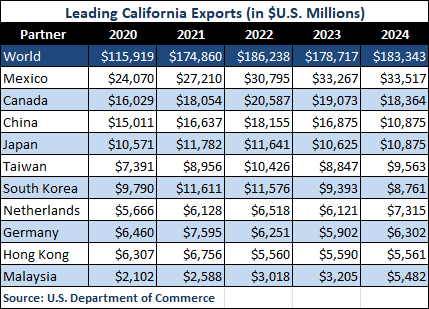 South Korea is California’s sixth largest export destination. California is also one of the top exporting states to Korea, making up roughly 13% of U.S. exports. In 2024, California exported more than $8.76 billion to South Korea. Top products from California to Korea included non-electrical machinery ($1.84 billon), computers and electronic products ($1.64 billion), processed foods ($1.17 million), chemicals ($698 million), and agricultural products ($655 million).
South Korea is California’s sixth largest export destination. California is also one of the top exporting states to Korea, making up roughly 13% of U.S. exports. In 2024, California exported more than $8.76 billion to South Korea. Top products from California to Korea included non-electrical machinery ($1.84 billon), computers and electronic products ($1.64 billion), processed foods ($1.17 million), chemicals ($698 million), and agricultural products ($655 million).
California is the largest importing U.S. state for South Korean products with imports totaling $30.87 billion in 2024. Top imports were made up of computer and electronic products, making up over $10.42 billion of the total, followed by transportation equipment ($8.17 billion), electrical equipment, appliance & components ($2.44 billion), chemicals ($2.02 billion), and petroleum & coal products ($1.68 billion).
FDI – South Korea
According to the most recent figures in 2024, U.S. foreign direct investment in Korea totaled roughly $36.39 billion and was concentrated largely in the manufacturing, banking, and wholesale trade sectors. Korean foreign direct investment (FDI) to the United States reached $93.22 billion in 2024 and was the 12th largest source of FDI into the U.S. Korean FDI supported 98,300 jobs, invested $2.7 billion into research and development, and invested another $12.4 billion to expanding U.S. exports. The top industry sectors for Korean FDI were auto components, industrial equipment, electronic components, software and IT services, food and beverages, and consumer electronics. Select USA
More than 1 million Korean Americans live in the United States, with over 30% living in California. Los Angeles County alone is home to over 154,000 residents of Korean origin, according to the Migration Policy Institute. There also is a large population of Korean students studying at higher education institutions across the U.S., with many Korean visitors entering the United States via the U.S. Visa Waiver Program.
In California, the eleventh largest source of FDI through foreign-owned enterprises (FOEs) is South Korea. In 2024, South Korean FOEs in California provided 18,963 jobs through 441 firms amounting to $1.97 billion in wages. The top jobs by sector are wholesale trade, manufacturing, professional/business services, transportation/warehousing/utilities, and education and health (World Trade Center Los Angeles FDI Report).
Trade Agreements
CPTPP
S. Korea Decides to Join CPTPP Trade Agreement
Yonhap News Agency, April 15, 2022
U.S.-Korea Free Trade Agreement
CalChamber Reaffirms Support for KORUS as President Trump Signs Revised Deal
On Monday, September 24 at the UN General Assembly in New York, President Trump signed the revised KORUS deal with South Korean President Moon Jae-in calling it a “brand new agreement”.
USTR, South Korea Publish Modifications and Amendments to KORUS
CalChamber, September 11, 2018
On September 3rd, 2018 the U.S. Trade Representative released a statement on the outcome of the U.S.-Korea FTA Amendment Negotiations, announcing the original agreement which entered into force in 2012 has been modified to “improve implementation of the trade pact”.
The amendments included an extension to the phase out period for the 25% U.S. tariff on trucks. The tariffs had been scheduled to phase out by 2021, but the amendment will lengthen the phase-out period to 30 years (i.e., until 2041). Additionally, the number of manufactured car exports to Korea under U.S. standards was doubled from 25,000 to 50,000. However, it is unclear as to whether or not these changes will exempt Korea from the potential auto tariffs threatened by the administration under Section 232.
Other amendments include harmonized vehicle testing requirements, Korean recognition of U.S. standards on parts, and improvements to fuel economy standards. There were also modifications to Korea’s customs and verification processes and its pharmaceutical pricing policy.
Per the USTR, Korea will now initiate the next step in its own domestic procedures, which is to open for public comment the provisional Korean translations of the outcomes to amend the KORUS Agreement. Once complete and certified by both governments, the documents may then be finalized for signature. Per the US Chamber of Commerce, the Korean government hopes to ratify the agreement this year, bringing it into effect on January 1, 2019.
United States, South Korea Reach Agreement on Amendments to Free Trade Agreement March 29, 2018
The United States and South Korea this week announced reaching an agreement in principle on the general terms of amendments and modifications to the United States-Republic of Korea Free Trade Agreement (KORUS FTA).
“This represents important progress in improving U.S.-Korea trade and economic relations, based on their strong and enduring security relationship,” said U.S. Trade Representative Ambassador Robert Lighthizer.
According to the Office of the U.S. Trade Representative (USTR), the nations have also agreed on terms for a country exemption for the Republic of Korea from tariffs imposed on steel imports.
Negotiators are finalizing the terms of the KORUS FTA, which are subject to domestic procedures in both nations before provisions can be brought into force. The revised agreement addresses issues related to investment, tariffs, trade in automobiles, and trade remedies. Additional progress was made in the areas of pharmaceuticals, customs and textiles to smoothly implement the KORUS FTA.
The arrangement on steel imports is expected to take effect on May 1, 2018.
CalChamber Support for U.S.-South Korea Free Trade Agreement Reaffirmed September 5, 2017 The California Chamber of Commerce reaffirmed support for the U. S.-Korea Free Trade Agreement (KORUS) in a letter sent September 5 to members of the Trump Administration, including the Secretary of Commerce and the US Trade Representative.
March 15, 2017 marked the five-year anniversary of the entry into force of the CalChamber-supported U.S.-Korea Free Trade Agreement (KORUS). These past five years have been a period of growth and resurgence for the American economy, with 2016 recording solid GDP growth, a net gain of 2.4 million private-sector jobs, and the seventh consecutive year of net gain in manufacturing employment
The U.S.-Korea trade and investment relationship is substantially larger and stronger than before the KORUS agreement. Since entry into force of the agreement in 2012, the U.S. and Korea have carried out five rounds of tariff cuts and eliminations, creating significant new market access opportunities for U.S. exporters.
The agreement also has expanded opportunities for the growing U.S. services trade, improved transparency in Korea’s regulatory system, strengthened intellectual property protection, and leveled the playing field for key U.S. exports, including autos. Overall, U.S.-Korea goods and services trade has risen from $126.5 billion in 2011 to nearly $144.6 billion in 2016.
Four Year Snapshot: The U.S.-Korea Free Trade Agreement, USTR, March 15, 2016
Statement by Ambassador Michael Froman on the Third Anniversary of KORUS
USTR, March 13, 2015
3 Ways U.S.-Korea Trade Agreement Has Helped U.S. Dairy
U.S. Dairy Exporter Blog, March 16, 2015
Ag exports to Korea growing 7x faster than those to world at large
Farm Futures, March 16, 2015
U.S.-Korea Free Trade Agreement Shows Strong Results on Second Anniversary
In the two years that this landmark agreement has been in effect, Korea has become the sixth-largest trading partner of the United States, exports of U.S. manufactured goods to Korea have increased, Koreans are buying more U.S. services than ever, and U.S. exports of a wide range of agricultural products have seen significant gains. KORUS has also improved Korea’s investment environment through strong provisions on intellectual property rights, services, and investment, supporting U.S. exports.
USTR, March 12, 2014
“The KORUS Advantage: A Basic Guide for US Companies to the Contents of the KORUS FTA” was recently published by the U.S.-Korea Business Council and AmCham Korea. This guide provides guidelines for U.S. businesses looking to take advantage of the KORUS FTA.
“KORUS FTA Facts and Figures“ is a six-month overview of bilateral trade statistics since the KORUS FTA was implemented, released by the Embassy of the Republic of Korea in Washington, D.C.
The CalChamber was part of a broad-based coalition that waged a multi-year campaign to secure congressional passage of the U.S.-Korea FTA. Congress approved the FTA on October 12, 2011. The South Korean Parliament followed suit on November 22, 2011.
U.S.-Korea Trade Agreement Now in Effect
U.S. Korea Connect
To help you take advantage of the US-Korea FTA, the Korean
Embassy in the US has introduced a new website at
www.uskoreaconnect.org
updated LinkedIn and Twitter profiles.
| U.S.-Korea Trade Agreement Takes Effect Today Today is the implementation date for the landmark U.S.-Korea Free Trade Agreement (FTA), the product of years of collaboration by the business community and both governments. The California Chamber of Commerce-supported FTA is the biggest free trade pact the United States has reached since entering the North American Free Trade Agreement (NAFTA) in 1994. CalChamber, March 15, 2012 |
March 15, 2012 is the implementation day for the landmark U.S.-Korea Free Trade Agreement (FTA), the product of years of collaboration by the business community and both governments.
The California Chamber of Commerce-supported FTA is the biggest free trade pact the United States has reached since entering the North American Free Trade Agreement (NAFTA) in 1994.
Recognition goes to U.S. Trade Representative Ron Kirk for his leadership in getting the U.S.-Korea FTA to the finish line.
The United States has welcomed the newly appointed South Korean Ambassador to the United States, Choi Young-jin.
His Excellency Duk-Soo Han, former Prime Minister and Ambassador to the United States from the Republic of Korea, was instrumental in garnering support for the U.S.-Korea agreement. Han spoke to the CalChamber on several occasions, as did the Consuls General of Korea in San Francisco and Los Angeles.
The United States and the Republic of Korea announced on February 2, 2006 that they were beginning negotiations toward a bilateral FTA, with talks expected to take up to a year. Although the negotiations concluded on April 1, 2007, nearly five years passed before the FTA could be implemented.
Implementation of the U.S.-Korea FTA will eliminate tariffs and other barriers to trade in goods and services, promote economic growth, and enhance trade between the United States and Korea.
This comprehensive agreement was approved by the U.S. House (278-151) and the U.S. Senate (83-15) on October 12, 2011.
| U.S. – Korea FTA: Final Votes Ayes: Becerra, Berman, Bilbray, Bono Mack, Calvert, Campbell, Costa, Davis, Denham, Dreier, Eshoo, Gallegly, Herger, Issa, Lewis, Lungren, Matsui, McCarthy, McClintock, McKeon, Miller, Nunes, Pelosi, Royce, Sanchez (Loretta), Schiff, Thompson, Boxer, Feinstein Noes: Baca, Bass, Capps, Cardoza, Chu, Farr, Filner, Garamendi, Honda, Hunter, Lee, Lofgren, McNerney, Miller, Napolitano, Richardson, Rohrabacher, Roybal-Allard, Sanchez (Linda), Sherman, Speier, Stark, Waters, Waxman, Woolsey |
The U.S. International Trade Commission estimates that with full implementation of the KORUS FTA, U.S. goods exports to Korea will likely increase by $9.7-$10.9 billion and U.S. imports of goods from Korea will likely increase by $6.4-$6.9 billion, enhancing our already balanced trade partnership.
CalChamber Links
- U.S.-Korea Free Trade Agreement
- Association of Southeast Asian Nations (ASEAN)
- U.S.-Korea Trade Partnership
CalChamber Position
The California Chamber of Commerce, in keeping with long-standing policy, enthusiastically supports free trade worldwide, expansion of international trade and investment, fair and equitable market access for California products abroad and elimination of disincentives that impede the international competitiveness of California business. New multilateral, sectoral and regional trade agreements ensure that the United States may continue to gain access to world markets, resulting in an improved economy and additional employment of Americans.
Reasons for Position
- The U.S.- Korea FTA sends a strong signal that the United States intends to remain heavily engaged in the region for a long time to come in business, economics, security and international politics.
- The FTA strengthens a more than 70-year-old alliance between the United States and South Korea, reinforcing the economic and political reforms South Korea continues to make.
Regional Comprehensive Economic Partnership (RCEP)
After 8 years of negotiations, the Regional Comprehensive Economic Partnership (RCEP) was signed on November 15, 2020. The RCEP is a free trade agreement (FTA) with 10 Association of Southeast Asian Nations (ASEAN) member states—Brunei, Burma (Myanmar), Cambodia, Indonesia, Laos, Malaysia, the Philippines, Singapore, Thailand, Vietnam—and the five states with which ASEAN has existing FTAs—Australia, China, Japan, South Korea and New Zealand.
Please see the CalChamber’s RCEP page for more info.
RCEP – Association of Southeast Asian Nations
Text of the Regional Comprehensive Economic Partnership Agreement
WEST Program
WEST Program
The WEST (Work, English Study, and Travel) Program is a unique exchange program that provides an opportunity for Korean university students and recent graduates to come to the United States for a period of 18 months to study English and to participate in professional level internships of up to 12 months.
This program, which was agreed to by Korean President Lee and U.S. President Bush in 2008, was launched late last year and is fully supported by the Korean and U.S. governments.
The U.S. Department of State’s Bureau of Education and Cultural Affairs has designated the Korea-U.S. Science Cooperation Center in Vienna, Virginia (KUSCO) as a sponsoring organization of the WEST Program. If your company or organization would like learn more about this program, please visit https://culturalvistas.org/programs/specialty/korea-west/ .
2010 Asia Trade Mission
2010 Asia Trade Mission
| www.calchamber.com/2010AsiaTradeMission | |
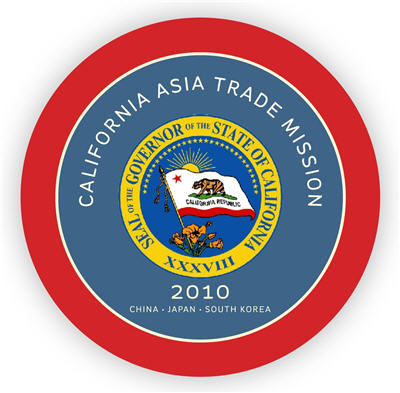
|
2010 Trade Mission to Asia Governor Arnold Schwarzenegger September 9 – 15, 2010Hangzhou ~ Shanghai ~ Tokyo ~ SeoulCalifornia Business DelegationCalChamber Joins Governor on Successful Asia Trade Mission CalChamber, September 21, 2010 |
Events
CalChamber Welcomes Representatives from the Consulate General of South Korea
On March 6, 2023 representatives of the Korean Consulate General met at the CalChamber with Vice-President for International Affairs, Susanne Stirling to discuss California – South Korea trade and investment issues, together with the November 2023 APEC meeting scheduled for San Francisco.
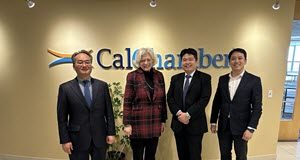
CalChamber Hosts Korea International Trade Association (KITA) Delegation
(June 26, 2013) CalChamber vice president of international affairs, Susanne Stirling meets with visitors from the Korea International Trade Association.
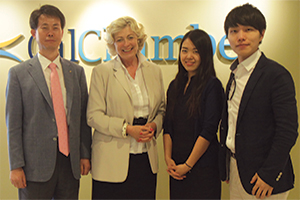
Korean Ambassador Highlights Trade Agreement at CalChamber Forum
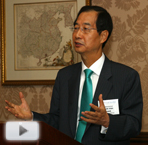
(September 8, 2010) Final approval of the U.S.-Korea Free Trade Agreement (FTA) will create American jobs, His Excellency Duk-Soo Han, ambassador to the United States from the Republic of Korea, told a California Chamber of Commerce gathering last week.
CalChamber Hosts Mayor of Gangnam, Korea
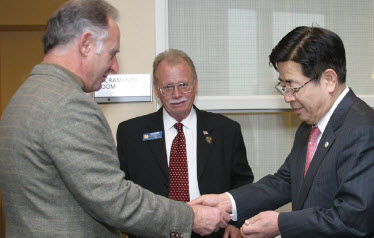
(January 31, 2008) CalChamber President Allan Zaremberg exchanges business cards with the Mayor Maeng Jung Ju of Gangnam, Korea on January 31, 2008. Accompanying the Korean delegation is Ronnie Guyer (center) field representative for Assemblyman Van Tran (R-Costa Mesa).
Korean Ambassador Urges Support for Free Trade Agreement
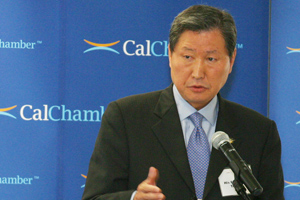
(August 29, 2007) The California Chamber of Commerce yesterday hosted His Excellency Lee Tae-sik, Korean Ambassador to the United States, at an international luncheon forum where he discussed the U.S.-Korea Free Trade Agreement (FTA), currently pending before Congress, and enumerated the benefits of the FTA for California businesses.
Key Country Contacts
Resources
CalChamber Resources
Business
Business
- California Governor’s Office of Business and Economic Development (GO-Biz)
- U.S. Commercial Service Korea
- AmCham Korea
- Embassy of Korea
- City of Busan
- Invest in Gyeonggi
- Korea Chamber of Commerce and Industry
- Korea Economic Institute
- Korea International Trade Association
- Korea Trade (KOTRA)
- Korea Trade (KOTRA) North America
- U.S.-Korea Business Council
Cultural
CalChamber Receives Korean Presidential Citation
On Thursday, December 6, the California Chamber of Commerce received the prestigious Presidential Citation from the government of the Republic of Korea for promoting U.S.-Korea trade and commercial relations, and specifically for contributing to the passage of the U.S.-Korea Free Trade Agreement (FTA).
CalChamber, December 11, 2012
Pictured: Consul General Jeong Gwan Lee and Consul Kwang Ho Lee of the Korean Consulate General in San Francisco present the Korean Presidential Citation to Mrs. Susanne Stirling, Vice President International Affairs, with 2012 Chair Tim Dubois observing.
